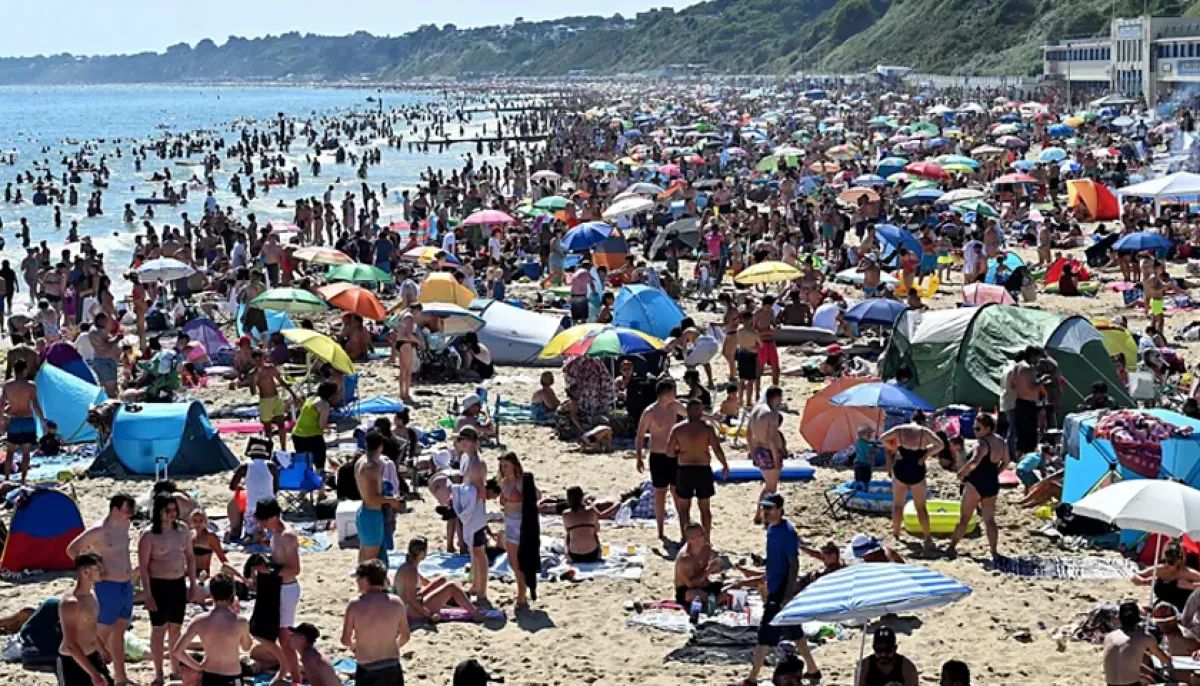
In June 2020, a popular British seaside town was swamped with beachgoers amid a global pandemic. One photographer captured the chaos.
In June 2020, the UK began to swelter amid a summer heatwave.Normally, Britons would flock to the country's iconic beach resorts, sunning themselves on pebbly beaches, feeding coins into garish arcade machines on "pleasure piers", and protecting their rapidly melting ice creams from the ever-present attention of marauding seagulls.
But this year was different.
Since March, the UK had been in lockdown. Pubs, clubs and theatres had shut their doors. The UK's high streets shops were largely closed except for supermarkets and food stores and a handful of other traders deemed essential. Sporting events, from horse racing to the country's world-famous Premier League football, had been cancelled. Despite stringent lockdowns, the death toll had climbed day after day; by early June, some calculated that 50,000 people had died from the disease in the UK since the outbreak started.
In the middle of June, however, the British government made tentative steps to try and re-open some elements of society. They allowed many shops to re-open (though pubs and restaurants were still shut) and made plans to relax the 2m (6.6ft) social distancing down to 1m (3.3ft).
As the mercury climbed, the Covid restrictions seemed to ease, at least a little.
On 25 June, 2020, the UK recorded its highest temperatures of the year so far; as high as 33.3C (92F). In the county of Dorset, the hot, sunny weather resulted in Bournemouth, Christchurch and Poole Council, which oversees three of the most popular seaside resorts, declaring a major incident. Britons appeared to have decided, en masse, to have all had the same idea: try and cool off at the beach.
News agency Agent-France Press (AFP) photographer Glyn Kirk would normally have been spending a hot Saturday shooting cricket matches; but this being 2020, all the cricket matches were cancelled. He found himself, instead, with a news assignment: head to Bournemouth and take pictures of the crowds.
"You can see it looks really busy," says Kirk, looking back over images at his home in seaside city of Brighton. "You can see people were kind of distanced on the beach. It was weird. How can all these people keep away from each other?"
The last crowd Kirk had seen of this size had been in March, the Cheltenham Gold Cup. This premiere horse racing event, which drew nearly 250,000 over four days. "And then the following day they announced that, you know, the Covid thing [lockdowns] was coming in," Kirk says. The Gold Cup was considered by a former UK chief scientific advisor to have been a super-spreader event, sending newly affected racegoers back to their homes across the country.Back on the Dorset beaches. At the time, the BBC reported gridlocked streets, overflowing waste, fights and people camping on the beach because they could not return home. In its coverage, the Daily Telegraph newspaper even described the scene as "Armageddon".
"I can remember at the time, there was people complaining that we were making the beach look busier than I actually was," Kirk says. He says he took many of his shots on a 70mm portrait lens, a focal length which doesn't compress the perspective as much as the long lenses used for sports events.Kirk says that deluge of people meant he had to park his car miles away from Bournemouth's beach, and walk there and back, weighed down with his photographic gear to take the pics the agency needed. Even sending the pictures back to the office was a challenge: "There were so many people on the beach on their phones, the network was swamped. I had to walk ages just to find somewhere quiet to send the pictures back."
Over two days of crowded beaches, the local council's waste services had to clean up some 41 tonnes of waste – including human effluent. Because of the Covid restrictions, none of the usual public toilets were open, adding an extra public health issue.
It was a problem Kirk knew well from his wanderings around locked-down London. "When we were in the centre of town, certainly for the first few months, there were no toilets open in the Tube stations and stuff. So, yeah, you had to go. I think I went about eight hours one day without going to the toilet, which is a record for me. That was hard. That was the difficult bit of walking around, doing news stuff. Because everyone was shut, you couldn't even pop into a café."
Living in Brighton, Kirk had become used to seeing the strange sight of a British beach relatively devoid of life over the previous few months. "I think the seagulls were wondering what was going on, because there's no one there, there's no chips to rob from people. You were definitely thinking, 'this is strange. Why is there no one here?'"source : BBC
